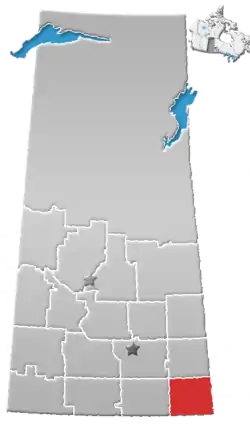Alida, Saskatchewan
Alida /əˈliːdə/ ə-LEE-də[3] (2016 population: 120) is a village in the Canadian province of Saskatchewan within the Rural Municipality of Reciprocity No. 32 and Census Division No. 1. The village is approximately 85 km (53 mi) east of the City of Estevan. Farming and oil are the major local industries. Several ghost towns are in the vicinity, including Nottingham to the east, Auburnton, to the west, and Cantal to the northwest. With the investment of oil and other industries the area continues to grow.
Alida | |
|---|---|
| Village of Alida | |
Flag | |
 Alida Location in Saskatchewan  Alida Alida (Canada) | |
| Coordinates: 49°23′20″N 101°52′27″W | |
| Country | Canada |
| Province | Saskatchewan |
| Region | Southeast |
| Rural Municipality | Reciprocity |
| Post office Founded | 1913-12-01 |
| Government | |
| • Type | Municipal |
| • Governing body | Alida Village Council |
| • Mayor | James Boettcher |
| • Administrator | Kathy Anthony |
| • MP | Robert Kitchen |
| • MLA | Daryl Harrison |
| Area | |
| • Total | 0.37 km2 (0.14 sq mi) |
| Population (2016) | |
| • Total | 120 |
| • Density | 327.2/km2 (847/sq mi) |
| Time zone | UTC-6 (CTS) |
| Postal code | S0C 0B0 |
| Area code(s) | 306 |
| Highways | |
| Railways | Abandoned |
| [1][2] | |
History
Alida was founded as a Canadian Pacific rail station in the late 19th century, and it was named for Dame Alida Brittain. The local area was settled by immigrants from Europe, and other parts of North America. Alida incorporated as a village on February 19, 1926.[4]
The rail line was closed in 1976 when a spring storm washed out the rail bridge near Lauder, Manitoba, at the beginning of the line. The economic viability of the line had been in question for some time, so the bridge was never repaired. Track was removed beginning in 1978.[5]
Demographics
In the 2016 Census of Population conducted by Statistics Canada, the Village of Alida recorded a population of 120 living in 63 of its 68 total private dwellings, a -9.2% change from its 2011 population of 131. With a land area of 0.37 km2 (0.14 sq mi), it had a population density of 324.3/km2 (840.0/sq mi) in 2016.[8]
In the 2011 Census of Population, the Village of Alida recorded a population of 131, a 23.6% change from its 2006 population of 106. With a land area of 0.37 km2 (0.14 sq mi), it had a population density of 354.1/km2 (917.0/sq mi) in 2011.[9]
Attractions
Alida has a skating/curling rink. Alida Memorial Hall hosts weekly bingos and an annual dinner theatre. they also have a pool that opens during the summer
Sports
The local hockey team is the Alida Wrecks.
Education
The local school closed down in 2005, and students are bused to schools in Carnduff, Oxbow, or Redvers.
Notable people
- Dan D'Autremont - Saskatchewan Party member of the Legislative Assembly of Saskatchewan for the constituency of Cannington
References
- National Archives, Archivia Net. "Post Offices and Postmasters". Archived from the original on 2006-10-06. Retrieved 2014-08-21.
- Government of Saskatchewan, MRD Home. "Municipal Directory System". Archived from the original on 2016-01-15. Retrieved 2014-08-21.
- The Canadian Press (2017), The Canadian Press Stylebook (18th ed.), Toronto: The Canadian Press
- "Urban Municipality Incorporations". Saskatchewan Ministry of Government Relations. Archived from the original on October 15, 2014. Retrieved June 1, 2020.
- "Alida on epodunk.com". Retrieved 2008-02-11.
- "Saskatchewan Census Population" (PDF). Saskatchewan Bureau of Statistics. Archived from the original (PDF) on September 24, 2015. Retrieved May 31, 2020.
- "Saskatchewan Census Population". Saskatchewan Bureau of Statistics. Retrieved May 31, 2020.
- "Population and dwelling counts, for Canada, provinces and territories, and census subdivisions (municipalities), 2016 and 2011 censuses – 100% data (Saskatchewan)". Statistics Canada. February 8, 2017. Retrieved May 30, 2020.
- "Population and dwelling counts, for Canada, provinces and territories, and census subdivisions (municipalities), 2011 and 2006 censuses (Saskatchewan)". Statistics Canada. June 3, 2019. Retrieved May 30, 2020.
